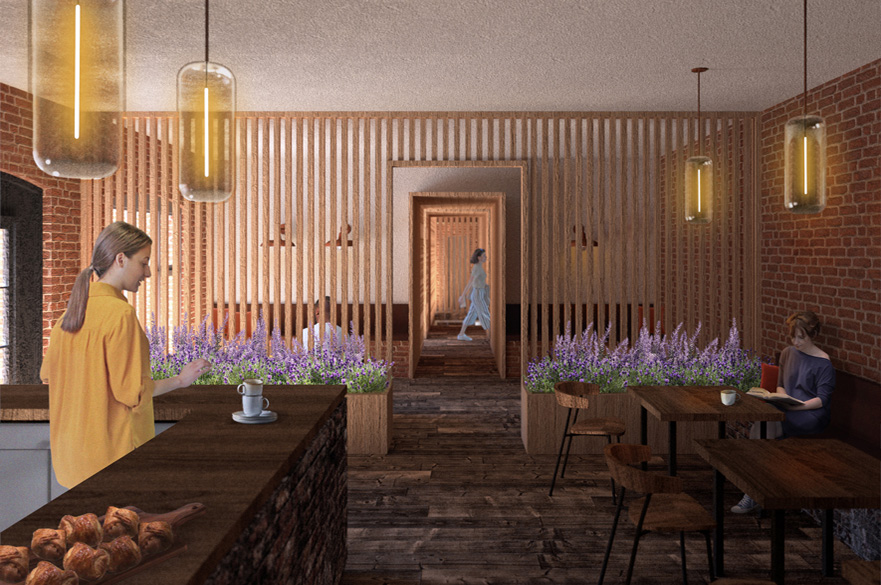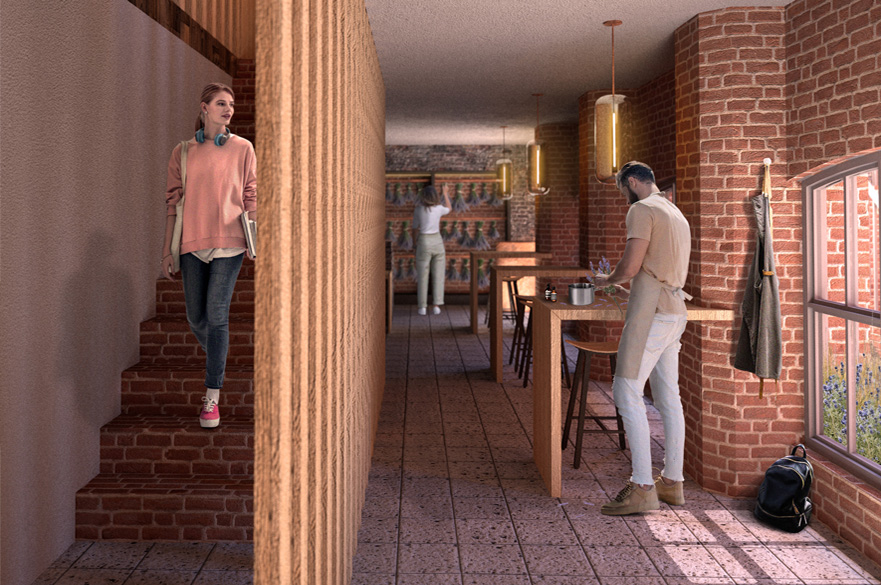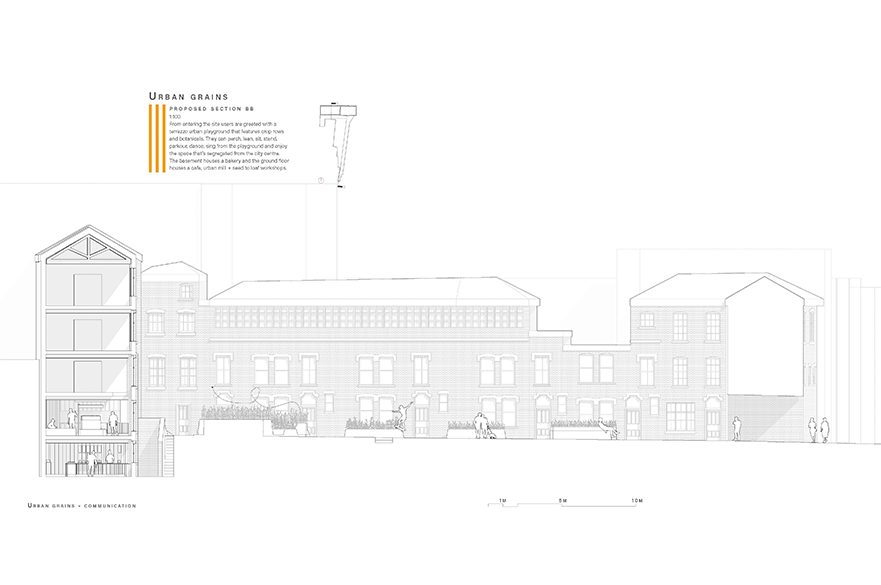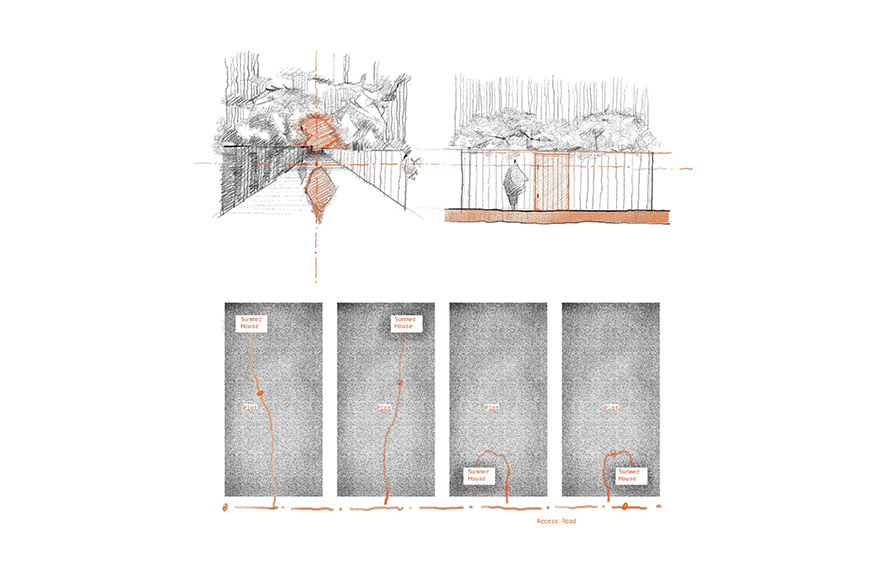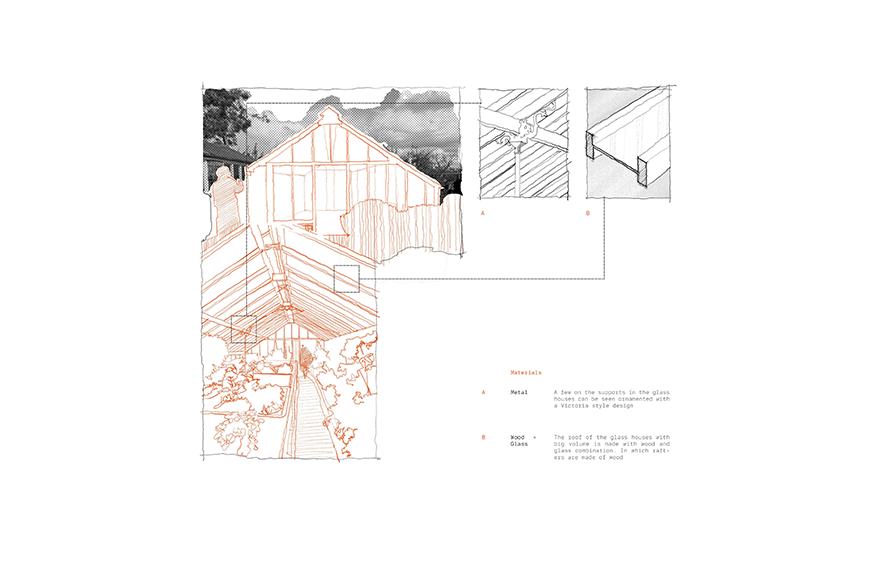Interior Architecture and Design MA
About this course
Our Masters course in Interior Architecture and Design offers a multi-dimensional platform that explores and interrogates crucial discussions surrounding interior, spatial, and architectural design. Now more than ever this specialised intersection is essential to redefining how we interact with the worlds around us; from the immediately personal, to the collectively experiential.
Within the studio-centric culture you will have the opportunity to develop through a combination of explorative design projects and skill-based modules. Throughout the programme, you will work on a structured series of theoretical designs to investigate methodologies in context, focusing on the interrogation, manipulation, and definition of space.
Studio projects are introduced sequentially throughout the year and each one will examine differing scales, combinations, and typological genres within the thematic context of interior architecture and design. Across all projects, an emphasis on research is used as an informing platform for independent exploration and discussion, enabling varied and unique responses to each brief.
Who is this course designed for?
The course is tailored for graduates in the wider and associated field of interior architecture and design but is equally available to professionals and graduates of a related profession irrespective of background.
The course is fundamentally created for those share a passion in progressing architectural design and a desire to interrogate and develop the future of what the interior might be. It is a platform for expression, creativity, and crucial thinking alike, and we encourage everyone who joins the MA in Interior Architecture and Design to challenge the very nature of course itself.
Visit our Interior Architecture and Design Student Showcase, an online exhibition celebrating the work of our Class of 2024.
-
Study in the heart of Nottingham — one of Europe’s top 25 student cities, and home to over 75,000 learners (QS Best Student Cities, 2025).
-
Learn from the experts — Architecture at NTU is ranked 1st in the UK for Teaching Quality (Times and Sunday Times Good University Guide, 2025).
-
2nd most sustainable university in the world (UI GreenMetric World University Rankings 2024).
-
Work in our inspiring Grade II* listed Gothic Revival style Arkwright building, offering industry-standard facilities and studios.
What you’ll study
Unlike a conventional undergraduate programme, the Masters in Interior Architecture and Design is less prescriptive over the fundamental conventions associated with the discipline. Instead, the course focuses on enabling individuality through unique responses to interior-centric challenges. These are explored through the combination of design projects and skill-based supporting modules, which ensure a platform for growth.
Each design project offers an opportunity for examining thematic topics, in which particular personal interests can be expressed to expand the scope of the brief. It is encouraged that these topics and interests therefore combine to develop advanced design thinking, and the skills for solving a range of challenges.
Core modules
- Design Studio 1 (40 credit points)
- Design Research and Practice (20 credit points)
- Design Studio 2 (60 credit points)
- Major Study Project (60 credit points)
Design Studio 1 (40 credit points)
- This module will develop your foundational skills in the core principles and practices that underscore the discipline of Interior Architecture and Design. You’ll be encouraged to enhance and refine your creativity, contextual awareness, and acquire new knowledge and skills to connect theory with practice through exploratory tasks, questioning with an enquiring mind to allow for critical reflection.
- You’ll refine design concepts and your communication skills using a range of mediums to address spatial challenges with cultural and contextual sensitivity.
Research and Practice (20 credit points)
- This module enhances your understanding of research methods in design theory and practice and supports your preparation for your Major Study Project. Through skills audits and customised learning plans, you will develop your understanding of research methods, academic writing, and professional practices, fostering critical, evidence-based, and reflective thinking.
Design Studio 2 (60 credit points)
- Building upon our knowledge and skills gained in Design Studio 1, in this module you’ll develop innovative designs for adaptive reuse projects by analysing existing buildings, integrating sustainable technologies, and addressing contemporary human behaviours, ergonomic needs, and socio-cultural dynamics.
- It will help you prepare for your NTU Degree show and identify the direction your studies will take for the Major Study Project by exploring specialist pathways. You will explore sustainable design strategies, carbon, and the entire lifecycle of the scheme’s construction, gaining greater awareness of significance, and focusing on creating holistic, sustainable interiors.
Major Study Project (60 credit points)
- Your Major Study Project refines your design and research skills, enabling you to advance your intellectual and practical skills and develop your direction into a personalised path.
- You can choose from three pathways — A Detailed Design Study Project, a Design Consultancy Report, or a Design Thesis. These pathways allow you to apply your advanced knowledge, skills and develop your professionalism.
Further information on what you'll study
Through our taught modules and applied design projects, you will:
- develop and apply a reflective, systematic and investigative approach to both theoretical and practical design and technology
- identify critically evaluate and apply knowledge of innovative technologies relevant to current issues in the built environment
- evaluate the social, cultural, environmental and commercial context within which contemporary research, design and construction take place
- take professional and ethical considerations into account in the development of key relationships between built environment stakeholders and the general public
- work both individually and in groups, recognising the pivotal role of appropriate and effective communication as applied to built environment projects and scenarios.
By the completion of the course, you will be able to:
- learn through reflection on experience, and demonstrate effective working practices using a broad range of measurable criteria in design, professional and technology applications
- critically appraise and synthesise ideas about the built environment from a wide variety of sources
- communicate ideas, concepts, plans and designs, using a variety of approaches including written, oral and computer-based presentations
- undertake design and technical roles within a built environment team and exercise leadership.
We regularly review and update our course content based on student and employer feedback, ensuring that all of our courses remain current and relevant. This may result in changes to module content or module availability in future years.
Don’t just take our word for it, hear from our students themselves
Student Work
Video Gallery
How you're taught
How will I learn?
Course content is delivered through a range of methods throughout the year, including plenty of opportunities to work collaboratively with your peers and tutors discuss and build upon ideas. In addition to the design studio, you'll also utilise our model making workshop to produce large and small-scale prototypes, to test your design concepts.
Methods of teaching include:
- Lectures and seminars
- Tutorials
- Critiques
- Case studies
- Workshops
- Industry speakers
- Directed and independent learning.
Study trips
Field trips and study visits are an important part of your learning. Trips may include site visits and visits to practices, museums, exhibitions and events. Where a trip is mandatory it will be aligned to your modules and inform project work, and substantive costs – including travel and accommodation – will be paid for by the school. Optional trips may also be organised which can provide additional opportunities to enhance your knowledge and experience. Optional trips may incur a cost to the student. A valid passport and any associated visas will be required for trips outside of the UK.
Design studios
Your design studios are a big part of your learning and reflect the approach typically encountered in professional interior architecture and design practice. Collaboration is key as you study with your peers to address a range of creative approaches, moral, aesthetic, and theoretical positions related to your projects.
Study group tutorials
The study group tutorials are structured to replicate team meetings that are commonplace in design practices. Lecturers will provide teaching support in the studio as you apply your theoretical and practical skills to design projects. You're encouraged to articulate your design proposals in an objective and critical manner and to develop interpersonal communication skills which are invaluable to any walk of professional life.
How you're assessed
The ethos of combining theory and practice is strongly reflected in the nature of assessments. All assessment is coursework based, requiring you to undertake practical work, together with research and critical evaluation to demonstrate the link between theory and practice. The main assessment methods are:
- individual and group-based design projects and reports
- narrative and visually-based essays and reports
- individual and group presentations
Careers and employability
This course is suitable for professionals working in a related industry looking to progress or specialise in their career, and for graduates with a related honours degree.
Where do MA Interior Architecture and Design graduates from NTU work?
The course’s multidisciplinary approach will open doors for you to work in a variety of roles within art, design and architectural practices.
Companies include:
- Liv FAMA
- Welham Architects
Recent graduate roles have included interior designer, retail designer, and various other roles in design firms and consultancies in the UK and overseas.
Our MA Interior Architecture and Design course has been designed to maximise the employability prospects of our graduates, equipping you with professional skills as well as enhancing and developing your design skills, technical knowledge and ability to communicate your ideas.
Our Employability team
Our expert Employability team will work closely with you at every stage of your career planning, providing personal support and advice. You can benefit from this service at any time during your studies, and for up to three years after completing your course.
Throughout the year, our Employability team runs a series of events specifically for students studying in the School of Architecture, Design and the Built Environment. This includes the Property, Design and Construction Fair, where employers from all over the UK come to the University to advertise their graduate roles to our students.
Re:search Re:imagined
To us, research is about more than writing papers and proposing new ideas. By daring to think differently, we’re disrupting the research landscape and finding the answers to the questions that really matter. From sustainable cities to smart and virtual heritage technologies, we’re inspiring the brightest minds to rise up and find solutions to some of the most significant global challenges facing society.
NTU Enterprise
You'll also have the opportunity to turn your ideas into a viable business with help from NTU Enterprise, NTU's purpose-built Centre for Entrepreneurship and Enterprise, a support centre to help students create, develop and grow their own businesses.
What's the difference between this course and a degree in interior design?
Our Interior Architecture and Design degree at NTU will enable you to discover how space can be formed, light can be controlled, and function and history can be considered, to create architectural space and interior environments that are beautiful and functional. A degree in interior design may include how to approach the styling of interior spaces and the applied decoration of them. On our course you'll develop key transferable skills and in practice your role will overlap with architecture, interior decoration and interior design.
What our students are doing now
NTU alum Salomey Doku publishes acclaimed graphic novel
NTU alum Salomey Doku is applauded as an exciting talent with the publication by HarperCollins of her graphic novel Brielle and Bear: Once Upon a Time
Nottingham Trent University wins highest national honour for cultural heritage science research
Campus and facilities
Interior Architecture and Design facilities
From the studios to the workshops to the study centre and lecture halls, there is space and resource for everyone to work, learn and develop designs and projects.
IT resources
Our IT resource rooms and PC clusters are distributed across our City Campus, with PCs providing access to Microsoft Office, email, web browsing, networked file storage and high-speed online printing services, with a free printing allowance for each student.
Resource rooms are available 24 hours a day.
Books and library resources
Our state-of-the-art Boots library will give you access to an extensive and diverse range of books and periodicals that focus on specialist areas within Architecture. The library's OneSearch system provides access to all our electronic resources, journals and books.
Within the library there is a liaison librarian who has specialist subject knowledge and can offer detailed help in finding and using print and electronic resources, and also with areas such as Harvard referencing and research skills.
Bonington Art Shop
Our specialist in-house art shop is based in the Bonington building. Run by experienced and friendly University staff, the shop stocks a wide variety of arts and crafts materials to support your project work.
Entry requirements
What are we looking for?
- 2.2 honours degree (or equivalent) in a relevant (cognate or semi-cognate) discipline, including, but not limited to: architecture, interior architecture and design, or building surveying.
- Applicants with non-standard entry requirements and / or relevant experience will be considered on an individual basis.
We specify these minimum entry requirements, but we will assess you individually on your ability to benefit from the course. We sometimes offer places on the basis of non-standard entry qualifications, and industrial or professional experience.
Work submission
If your initial application is successful, you'll be asked to upload a digital portfolio of your work to the University.
Take a look at our digital portfolio advice.
Advanced entry
NTU may admit a student with advanced standing beyond the beginning of a course, through an assessment of that student's prior learning, whether it is certificated or uncertificated. Our Recognition of Prior Learning and Credit Transfer Policy outlines the process and options available to these prospective students, such as recognising experiential learning or transferring to a similar course at another institution, otherwise known as credit transfer.
All prospective students who wish to apply via Recognition of Prior Learning should initially contact the central Admissions and Enquiries Team who will be able to support you through the process.
Getting in touch
If you need any more help or information, please contact us at Ask NTU or call +44 (0)115 848 4200.
Getting in touch
If you need more help or information, get in touch through our enquiry form
What are we looking for?
You will need one of the following:
- 2.2 honours degree (or equivalent) in a relevant (cognate or semi-cognate) discipline, including, but not limited to: architecture, interior architecture and design, or building surveying.
- Applicants with non-standard entry requirements and / or relevant experience will be considered on an individual basis.
We specify these minimum entry requirements, but we will assess you individually on your ability to benefit from the course. We sometimes offer places on the basis of non-standard entry qualifications, and industrial or professional experience.
International qualifications
We accept qualifications from all over the world – check yours here:
Your portfolio
If your initial application is successful, you'll be asked to upload a digital portfolio of your work to the University.
Take a look at our digital portfolio advice.
Postgraduate preparation courses (Pre-Masters)
If you don’t yet meet our entry requirements, we offer Pre-Masters courses through our partner Nottingham Trent International College (NTIC), based on our City Campus:
English Language entry requirements
You can meet our language requirements by successfully completing our pre-sessional English course for an agreed length of time, or by submitting the required grade in one of our accepted English language tests, such as IELTS:
Would you like some advice on your study plans?
Our international teams are highly experienced in answering queries from students all over the world. We also have members of staff based in Vietnam, China, India and Nigeria and work with a worldwide network of education counsellors.
Complete this simple form to keep in touch with the International Office.
Fees and funding
Fees for 2025 entry
| Study route | Home (UK students) fees |
|---|---|
| Full-time (1 year) | £9,900 |
Please note that if you are considering a course that runs over more than one year, the tuition fee stated is for the first year of study. The course fee for the second year may be subject to annual review.
Alumni discount and scholarships
We're happy to offer a 20% alumni discount to most current NTU students and NTU alumni for courses starting between September 2025 and August 2026. This discount is available for those starting on an eligible postgraduate taught, postgraduate research or professional course.
You might be able to get a scholarship to help fund your studies. We award scholarships to those students who can demonstrate excellent achievement, passion and dedication to their studies.
Find out more about our discount and scholarships.
Funding your studies
Preparing for the financial side of student life is important, but there's no need to feel anxious and confused about it.
There are numerous sources of funding available for postgraduate students, both from external sources such as the Government and funding bodies, and from the University.
There are two main costs involved with postgraduate study: the cost of your tuition fees which is paid directly to the University, and living expenses such as accommodation, travel and food.
You might be able to get a scholarship to help fund your studies. We award scholarships to those students who can demonstrate excellent achievement, passion and dedication to their studies.
Please take a look at our postgraduate funding page for information about sourcing grants, bursaries and scholarships, and much more.
Additional costs
Printing: £300 (estimate) and model-making resources £250 (estimate). The School will provide you with simple model-making materials, grey card, brown card, and MDF baseboards.
In addition, most study modules will recommend one or more core textbooks, which most students choose to purchase. Book costs vary between courses and further information is available in the University’s bookshop. A good supply of these essential textbooks are available in the University libraries which students can easily borrow or access directly whilst studying in the library.
Students will also be expected to pay for any travel, accommodation and living costs if they choose to undertake work experience alongside their studies.
The substantive costs of all mandatory study trips on the course –including travel and accommodation –will be paid for by the School. All other additional costs will need to be covered by the student.
The School will provide infrastructure costs for your Degree Show, including course catalogue, exhibition printing and set-up costs.
Getting in touch
For more advice and guidance, you can contact our Student Financial Support Service by calling +44 (0)115 848 2494.
Fees for 2025 entry
| Study route | EU and International fees |
|---|---|
| Full-time (1 year) | £17,850 |
Please note that if you are considering a course that runs over more than one year, the tuition fee stated is for the first year of study. The course fee for the second year may be subject to annual review.
Additional costs
Printing: £300 (estimate) and model-making resources £250 (estimate). The School will provide you with simple model-making materials, grey card, brown card and MDF baseboards.
In addition, most study modules will recommend one or more core textbooks, which most students choose to purchase. Book costs vary between courses and further information is available in the University’s bookshop. A good supply of these essential textbooks are available in the University libraries which students can easily borrow or access directly whilst studying in the library.
Students will also be expected to pay for any travel, accommodation and living costs if they choose to undertake work experience alongside their studies.
The substantive costs of all mandatory study trips on the course –including travel and accommodation –will be paid for by the School. All other additional costs will need to be covered by the student.
The School will provide infrastructure costs for your Degree Show, including course catalogue, exhibition printing and set-up costs.
Alumni discount and scholarships
We're happy to offer a 20% alumni discount to most current NTU students and NTU alumni for courses starting between September 2025 and August 2026. This discount is available for those starting on an eligible postgraduate taught, postgraduate research or professional course.
You might be able to get a scholarship to help fund your studies. We award scholarships to those students who can demonstrate excellent achievement, passion and dedication to their studies.
We also offer international scholarships of up to 50% of your tuition fee. You can apply for your scholarship when you have an offer to study at NTU.
Find out more about our discounts and scholarships.
Living costs
Get advice on the cost of living as an international student in Nottingham and how to budget:
Paying fees
Find out about advanced payments, instalment plan options and how to make payments securely to the University:
Would you like some advice on your study plans?
Our international teams are highly experienced in answering queries from students all over the world. We also have members of staff based in Vietnam, China, India and Nigeria and work with a worldwide network of education counsellors.
Complete this simple form to keep in touch with the International Office.
How to apply
Ready to join us?
If you are interested in joining us in September 2025, this course will be open for applications through the applicant portal from September 2024. Courses starting in January 2026 will be open for applications from July 2025.
Applications to this course can be made through our NTU Applicant Portal.
You can get more information and advice about applying to NTU on our postgraduate pages.
Writing your application
Be honest, thorough and persuasive in your application. Remember, we can only make a decision based on what you tell us. Make sure you include as much information as possible, including uploading evidence of results already achieved, as well as a personal statement.
Work submission
If your initial application is successful, you'll be asked to upload a digital portfolio of your work to the University.
Take a look at our digital portfolio advice.
Keeping up to date
After you’ve applied, we’ll be sending you important emails throughout the application process - so check your emails regularly, including your junk mail folder.
Getting in touch
If you need more help or support, you can call our Admissions Team on +44 (0)115 848 4200, or contact us at Ask NTU.
Good luck with your application!
Apply online through our NTU Applicant Portal.
Application advice
Apply early so that you have enough time to prepare – processing times for Student visas can vary, for example. After you've applied, we'll be sending you important emails throughout the application process – so check your emails regularly, including your junk mail folder.
Writing your personal statement
Be honest, thorough, and persuasive – we can only make a decision about your application based on what you tell us:
Your portfolio
If your initial application is successful, you'll be asked to upload a digital portfolio of your work to the University.
Take a look at our digital portfolio advice.
Would you like some advice on your study plans?
Our international teams are highly experienced in answering queries from students all over the world. We also have members of staff based in Vietnam, China, India and Nigeria and work with a worldwide network of education counsellors.
Complete this simple form to keep in touch with the International Office.
